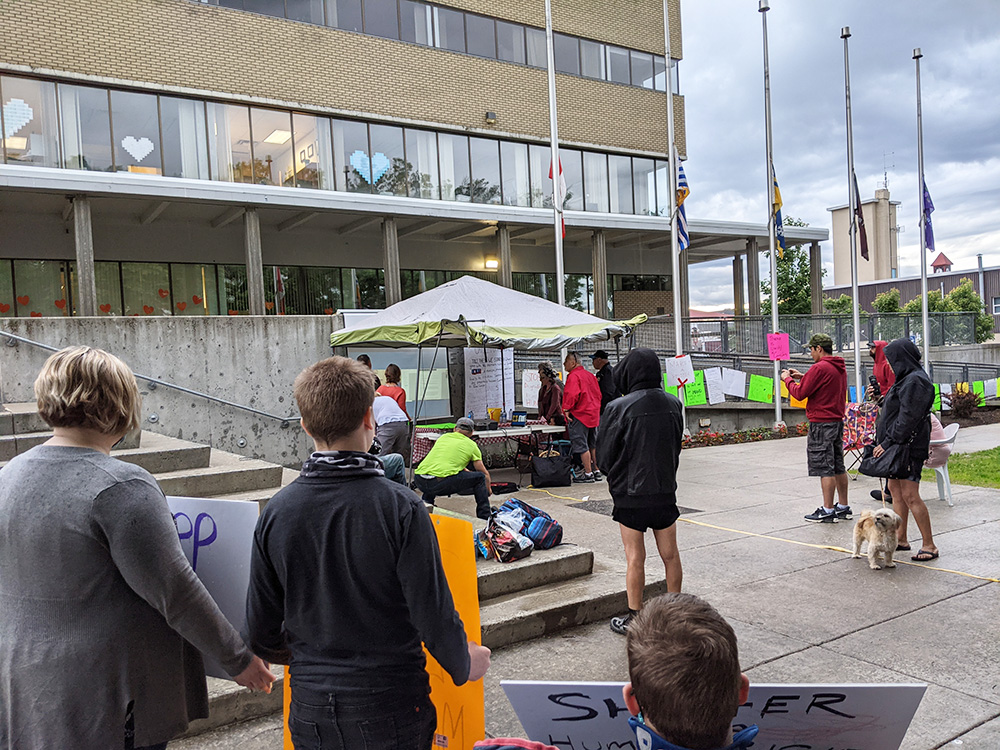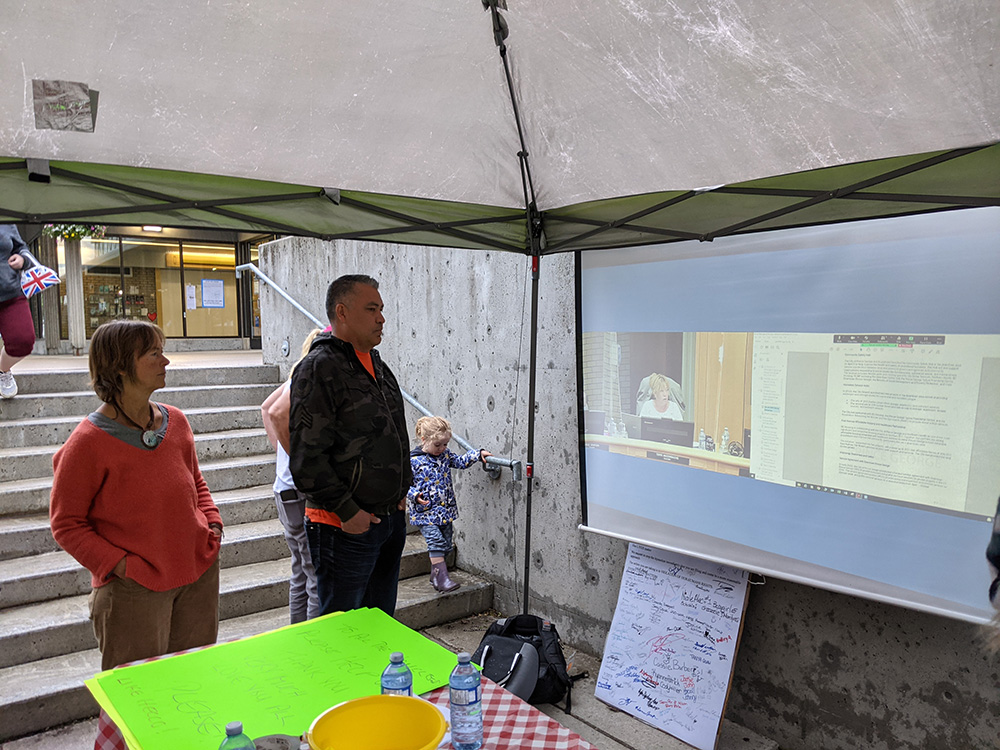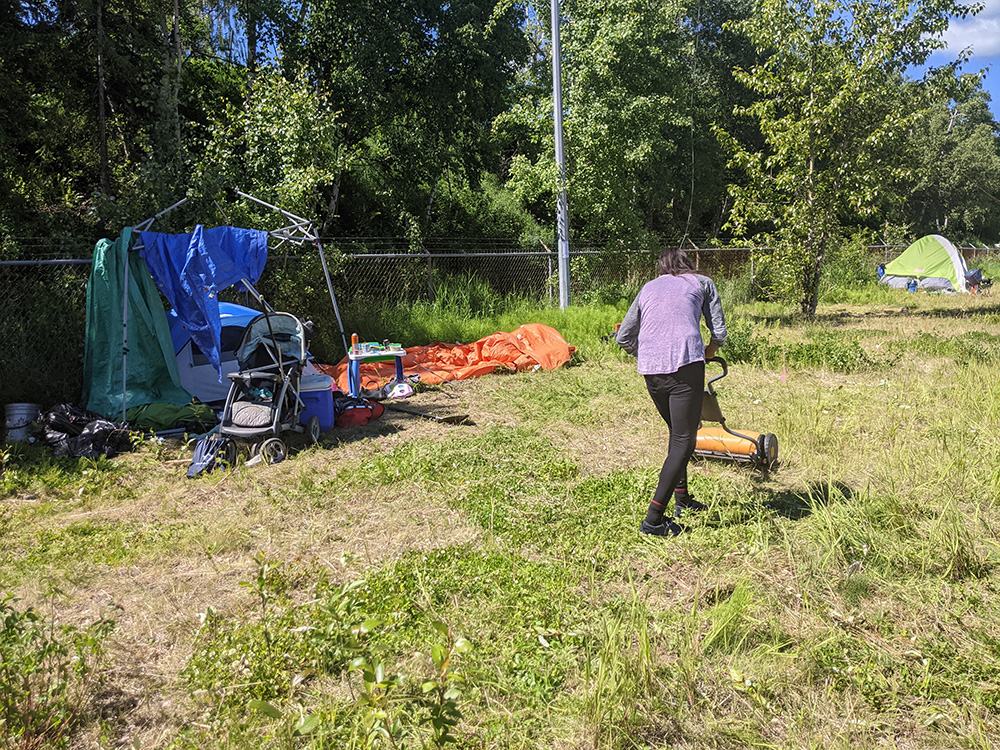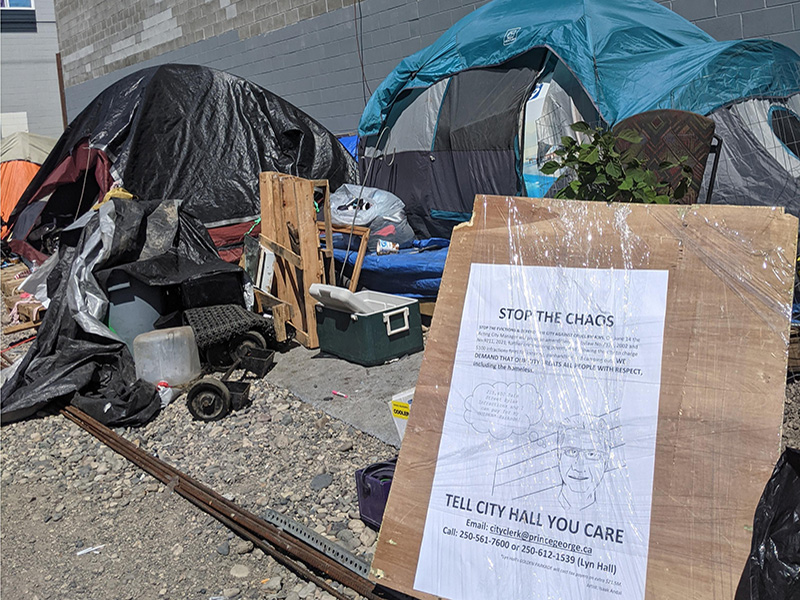Prince George could begin removing two homeless camps in its downtown as soon as today as advocates say they need more time to work with the city to find alternative housing for the dozens of people, mostly Indigenous, who will be left with nowhere to live.
Challenges faced by Prince George are not unique. Vancouver evicted residents at Strathcona Park encampment this spring.
And in Toronto, several people were arrested and one person pepper sprayed this week when city police removed a tent city that housed about 20 people.
But the overlapping opioid crisis and COVID-19 pandemic have hit B.C.’s northern capital especially hard, with pandemic restrictions causing a reduction in indoor services and moving more people onto the street.
The region’s large Indigenous population means many suffer the effects of intergenerational trauma inflicted by colonization and residential schools. About seven per cent of the city’s 82,000 residents are Indigenous, but roughly 80 per cent of its homeless population identified as Indigenous in a 2018 BC Housing survey.
That has prompted Indigenous groups to call for time and collaboration as the city threatens the evictions. In a joint news release June 14, the Union of BC Indian Chiefs, BC Assembly of First Nations and First Nations Summit said homelessness in Prince George has reached a crisis point.
“The city must provide alternative space for this encampment, and work with First Nations organizations and other service providers to support the encampment’s residents,” it reads.
In recent months, people have been subjected to hostile architecture and blaring opera music aimed at discouraging gathering in the downtown.

About a month ago, they began pitching tents, first on a vacant lot in the city centre and then at a green space in an industrial area near the downtown. Darleen LaRose was among the first to set up camp at the new site away from the city centre, which she jokingly refers to as “Moccasin Flats.”
“Everyone gets along here pretty good,” she says. “We support each other. I’m pretty much the Mama Bear of this place.” The residents look out for one another, she says, watching each other’s possessions after a spate of thefts from the encampment.
But that hasn’t stopped people from throwing rocks and firecrackers — even firing a BB gun — from an embankment above the camp at its residents. One man was hit in the face with a bear banger and another a BB gun pellet, LaRose says.
RCMP visit the camp often, she says, issuing tickets to those cycling without a helmet. Others have reported police walking through camps at night, rattling tents and telling people to leave.
She wasn’t always homeless, LaRose says. A few years ago she had a place to live, but she preferred to be on the streets watching over friends who found themselves with nowhere else to go.
She’d love to find a place to call her own but says she’s been repeatedly turned down. “They see you, if you’re Native, and they say it’s been rented out,” she says.
In the meantime, she prefers the encampment to staying at a shelter, unsure of whether she would be allowed to bring her dog, Misty.
Gerry Healy also knows how it feels to be adrift. The Prince George resident has experienced addiction and homelessness and says turning his life around was “one of the hardest things I’ve ever had to do.”
Now he wants to use that strength to help others.
“They are humans just like you or I, and they’re struggling. They’re the members of society who have fallen through the cracks,” says Healy. “I feel for these guys, because I know how hard it is to get away from that world. If you don’t have someone to give you a chance, I don’t think you stand a chance.”
Earlier this year, Healy created Together We Stand, a community group designed to de-stigmatize homelessness and find solutions to the city’s current crisis. A Facebook group created in February has topped 1,000 members.
Healy estimates there are about 60 people living in the camps and another 70 unhoused throughout Prince George.
“People are still stuck on the stigma of homelessness,” he says. “Some of them just want to gravitate towards somewhere safe and quiet, where they can stay without worrying about getting kicked out.”

Healy and other Together We Stand representatives plan to present to city council at a meeting on Monday evening. It’s unclear whether the city will move to evict the campers before that happens.
The city posted two-week eviction notices at the encampments on June 11 and 14. The deadline to vacate the areas was today and Monday.
On June 14, council gave first readings to a new Safe Streets Bylaw, which returns for final reading on Monday. The bylaw “deals with behaviour on streets and sidewalks such as aggressive panhandling, loitering, littering, sidewalk obstruction, graffiti, open drug use, needle disposal” and encampments, according to city administration.
A motion to delay a decision to allow for additional consultation with community groups was defeated.
An amendment to the city’s notice enforcement bylaw could see that people breaking the rules receive a $100 ticket, with a $75 penalty for late payment. It will also undergo final reading Monday.
In an email, City of Prince George senior communications officer Michael Kellett said the city is encouraging people to leave the encampments voluntarily so that legal action is not necessary. The residents have been provided with locations where shelter space is available, he said.
Prince George Mayor Lyn Hall did not respond to multiple interview requests from The Tyee.
Coun. Cori Ramsay, who voted against the Safe Streets Bylaw, says it won’t address the root of Prince George’s homelessness problems.
“Nuisance bylaws predominantly do not work,” she says. Instead, she believes the city should provide sanctioned camping areas or no-barrier housing for difficult-to-house residents.
“Our shelter system doesn’t work for everyone,” she says. “Some of the people in the encampment are banned from the shelters. Some of them don’t meet the requirements.”
That means many who are housed in the camps could be dispersed through the city in the coming days, something Ramsay says is not a solution.
According to a June 2 report to council, calls for service to the city’s bylaw officers have increased more than tenfold since 2017.
But Ramsay says those calls have dropped off over the past month, since people began congregating in defined areas.
“In the City of Prince George, we heard from RCMP that they haven’t had any calls or complaints from businesses as long as the encampment has been there,” she says, adding that she fears that removing the camps will increase conflict with local business owners.
“They’ll be back in doorways, back on the street,” she says.
Amelia Merrick is a member of Together We Stand. She says she’s heard from business owners that having the tent city has improved the downtown. She believes the city’s approach is short-sighted and that the camps could provide alternative housing while other options are hammered out.
“I went down there this morning. There was literally a woman mowing her lawn,” she says. “These people want a place to call home. They want to be able to hang their stuff up. They want to have a lawn.”
She says she spoke with people who are banned from shelters and unsure where they’ll go if evicted.
“There’s no plan,” she says. “They haven’t created any spaces for people… most affected to be part of the conversation.”

In recommending council pass the Safe Streets Bylaw, city staff also suggested it establish preferred locations for homeless encampments “when shelter space is unavailable.” Suggested locations are expected to be presented at Monday’s meeting.
But Healy points out there is a difference between available housing and appropriate housing.
He believes the majority of those facing displacement from camps would not use available shelter spaces. Mental health issues, drug use and strict rules keep many out of shelters and supportive housing, he says.
“This is why we need more low-barrier and zero-barrier housing,” he says. “A lot of them just want to live outdoors and just be left alone.”
Malachy Tohill, northern regional director for BC Housing, says Prince George currently has 151 emergency shelter beds, a number that includes additional beds usually offered during winter months that have been kept available during the pandemic.
Over the past month, BC Housing has opened 21 supportive housing units with 24-hour staffing, meals and life-skills programming, he says. The units are considered low-barrier, and more are on the way, with at least 100 more expected to open by spring 2022.
Tohill adds that the organization is willing to adapt its housing to the needs of those seeking shelter — such as finding a way to accommodate dogs.
In the coming weeks, one of its emergency shelters will begin offering an overdose prevention site where people can use drugs with supervision. More shelters are expected to offer the service in the near future, he says.
“If that’s a barrier, we want to remove it,” he says. “We’re always looking for new and inventive ideas on how we can get people into housing. These crises give us an opportunity to be together and to seek change.”
He says that BC Housing collaborates with other service providers and committees dedicated to improving the downtown.
Asked whether BC Housing would consider managing a tent encampment, Tohill says it would be a “last resort.”
“Right now, we have units available and we want to support people,” he says. “These shelters are a safe place to stay. They offer meals. They offer harm-reduction supplies, as in clean needles. They offer clean bedding, a place to do your laundry, have a shower — all those basic life pieces are provided by all the shelters.”
As the deadline to vacate the downtown camp arrives, LaRose says people have begun shifting to the new site, which also provides trees and shade as the city braces for a heat wave over the weekend. Volunteers plan to deliver supplies like water, ice, freezies and sunscreen, and there are plans to shuttle residents to cooling centres, if needed.
Come Monday, the camp could also face evictions. But Healy hopes the city will hold off on that long enough to hear from advocates and collaborate with service providers.
“We’re still in talks with several of these agencies to bring about change, or to just bring them to the table so that we can all align our efforts,” he says.
If law enforcement does come to remove the campers, supporters will be there to witness and try and prevent the evictions, he says.
“There are so many great people in our group and so many hard workers that, you know, some days it puts a lump in my throat to feel and see their passion,” he says. “I had a vision to bring people together to try to form a greater purpose, and it just happened. Now it’s taking off.” ![]()
Read more: Rights + Justice, Housing, Municipal Politics

















Tyee Commenting Guidelines
Comments that violate guidelines risk being deleted, and violations may result in a temporary or permanent user ban. Maintain the spirit of good conversation to stay in the discussion.
*Please note The Tyee is not a forum for spreading misinformation about COVID-19, denying its existence or minimizing its risk to public health.
Do:
Do not: